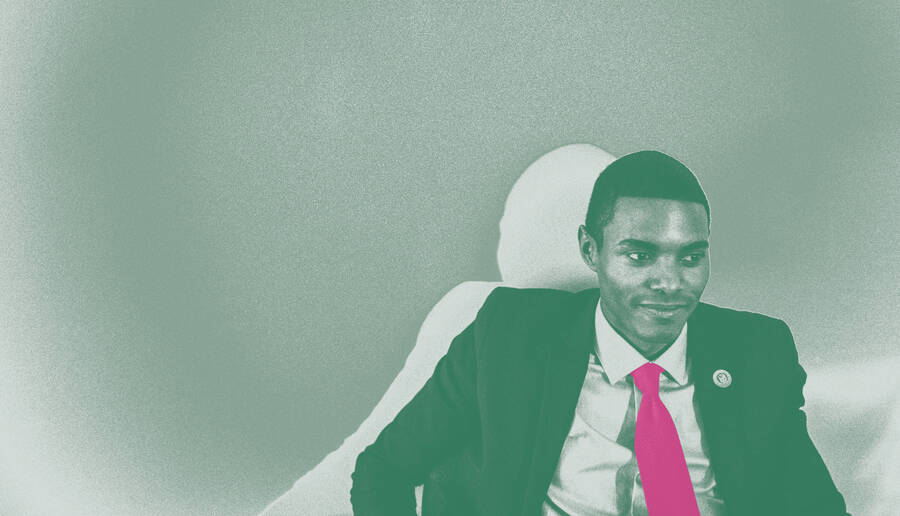ON MAY 13TH, three days after Israel began its most recent bombing campaign of the Gaza Strip, a group of progressive legislators gathered on the floor of the House of Representatives for an unprecedented session. Dispersed across the mostly-empty chamber in accordance with Covid protocols, the lawmakers—including most members of the group of legislators of color known as “the Squad”—rose one by one to express a position that only recently had seemed politically marginal: support for placing conditions on the military aid that the US sends to Israel, so that it cannot fund violence against Palestinians. The speakers explained this stance in terms never before uttered in Congress. Rep. Rashida Tlaib, the first Palestinian American woman in the body’s history, admonished her colleagues, who she said had a “duty to end the apartheid system that for decades has subjected Palestinians to inhumane treatment and racism.” Rep. Cori Bush connected the suffering of Palestinians to the racism experienced by Black Americans. “Palestinians know what state violence, militarized policing and occupation of their communities look like,” said Bush, who first rose to prominence as a Black Lives Matter organizer in Ferguson, Missouri. “So when heavily militarized police forces showed up in Ferguson in 2014 . . . our St. Louis Palestinian community, our Palestinian siblings, showed up too.”
During the last major Israeli bombing campaign in Gaza, in 2014, most Democrats responded with blanket support for Israeli Prime Minister Benjamin Netanyahu’s military campaign. This May, the violence that killed 260 Palestinians provoked a radically different reaction. Even New Jersey Senator Bob Menendez, who has described himself as “a lifelong friend to Israel,” raised questions about Israel’s decision to bomb a tower in Gaza that housed the Associated Press and Al Jazeera. Rep. Alexandria Ocasio-Cortez, with the support of 14 other legislators, introduced a resolution that would have blocked a $735 million arms sale to Israel, apparently the first-ever attempt by Congress to halt a US weapons deal with Israel. Senator Bernie Sanders followed with his own bill to block the sale. “It felt like a significant moment, [with] the Palestinian rights movement in Congress actually having some political power that forced some change,” said Brad Parker, senior adviser on policy and advocacy for Defense for Children International—Palestine.
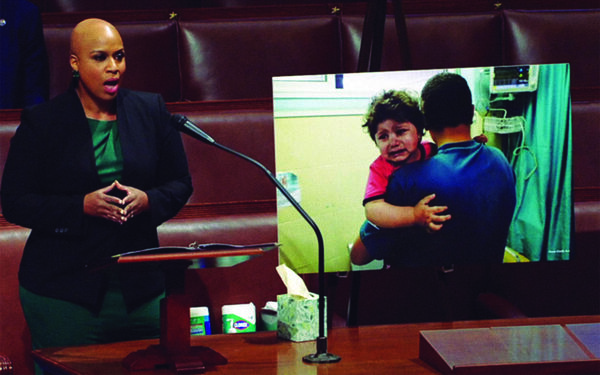
As the landscape of Democratic rhetoric on Israel has shifted, Bronx Congressman Ritchie Torres has attempted to stay planted in place. An Afro-Latino millennial who represents the most impoverished district in the country, Torres draws comparisons to his fellow New Yorker Ocasio-Cortez. But the day after the Squad’s speeches went viral, he took to the House floor to defend Israel’s attack on Gaza instead. He focused his remarks on “the trauma of Israelis seeking refuge in bomb shelters in the face of relentless rocket fire.” When he acknowledged the deaths of Palestinians, he attributed them to “the wretchedness of war” rather than the Israeli bombs falling on Gaza. He also took time to criticize a New York state assemblywoman backed by the Democratic Socialists of America (DSA), Phara Souffrant Forrest, lambasting her for tweeting a map of Palestine that predated the existence of Israel, which he likened to “wiping Israel off the map.”
As recently as a few years ago, every leading Democrat firmly upheld the bipartisan view of Israel as a key US ally. They reliably voted in favor of its unparalleled aid package from the US, and faithfully appeared at pro-Israel rallies and the annual AIPAC conference. But today’s Democratic Party is no longer a monolith on the question of Israel. Though the most powerful Democrats—from Chuck Schumer to Joe Biden—remain as committed as ever to a close alliance with Israel’s government, critics of the country’s human rights record have begun to win down-ballot races. In the Democratic primary in June 2020, the reliably hawkish Eliot Engel lost re-election to a progressive challenger, Jamaal Bowman, despite receiving millions of dollars from Israel-advocacy groups. (When Bowman, whose district includes Jewish communities in Riverdale and Scarsdale, scolded Torres during the violence this spring, Palestinian rights advocates took it as another sign that the terrain had shifted.)
Nationwide, support for Israel has slipped, especially among young, Black, and Latinx Americans; even among Jewish Americans, polls show growing dissent, with a quarter of Jewish voters agreeing in a recent survey conducted on behalf of the Jewish Electorate Institute that Israel “is an apartheid state.” Other polls have shown majority support among Democrats for cutting or imposing restrictions on the aid that Israel receives from the US. Israel advocates affiliated with the Democratic Party worry that their champions in Congress are dwindling. “When the old guard left is gone, the Nancy Pelosis and the others . . . there will be no fence around Israel, pro-Israel sentiment,” said Hank Sheinkopf, a Democratic operative and Israel supporter.
In the eyes of Israel’s advocates, Torres’s unique story—a tale of rising from poverty, battling homophobia, and winning political power—makes him an ideal messenger for their cause.
In the eyes of Israel’s advocates, Torres’s unique story—a tale of rising from poverty, battling homophobia, and winning political power—makes him an ideal messenger for their cause. “Ritchie Torres is very, very helpful. Why is he helpful? Because he is someone who speaks with moral authority,” said Ben Chouake, president of the Israel-advocacy group NORPAC. “He’s a poor kid from the Bronx. He’s a person of color. He’s openly gay. He’s got about as many markers people have prejudice against as anyone. And he’s pulled himself up by his bootstraps, become successful, and won a hotly contested primary. He speaks with clarity.” What Chouake describes as “moral authority” might also be called progressive credibility: As left-leaning groups—from the DSA to the Black Lives Matter movement—have linked the Palestinian rights movement with other anti-racist struggles, the Israel lobby has been ever more eager to recruit legislators of color who can recast “pro-Israel” politics in terms that appeal to a left-moving electorate.
In a sense, Torres is only the latest inheritor of a long tradition that includes established Black politicians like Hakeem Jeffries—who during Israel’s 2014 assault on Gaza vowed to “stand together, Israel today, Israel tomorrow, Israel forever”—and House Foreign Affairs Committee chairman Gregory Meeks, who on a recent trip to Jerusalem promised to “lock arm and arm” with Israel on Iran policy. Indeed, politicians of color have historically been among Israel’s most vocal defenders—and Black politicians who criticize the country’s human rights record have been more liable than white ones to face career-damaging criticism. But if the Squad’s members are the exception to the rule in the wider Democratic Party, among the smaller pool of millennial legislators, “Ritchie is unique,” wrote Chaskel Bennett, a member of the board of trustees for Agudath Israel of America, an Orthodox Jewish group, in an email to Jewish Currents. “He isn’t Jewish, has no sizable Jewish constituency and yet is one of the most outspoken pro-Israel voices in Congress.”
Torres has embraced this role. “I am the embodiment of a pro-Israel progressive,” he told Jewish Insider when he ran for Congress in 2019. “I am from the Bronx, I’m Afro-Latino, I’m Puerto Rican, I’m a millennial—but I’m also pro-Israel.” This stance has helped him draw a sharp contrast with his peers on the left, whom he has blamed for “catering to the extremes” in American politics. His defense of Israel has also secured his access to wide networks of funders: Collectively, “pro-Israel” groups and individuals gave Torres at least $117,000 in donations and advertising during his 2020 Congressional race; NORPAC was his fourth-most generous donor. (This year, even without an announced Democratic primary challenger, he has raised $74,540 from Israel advocates, including over $28,000 from NORPAC.)
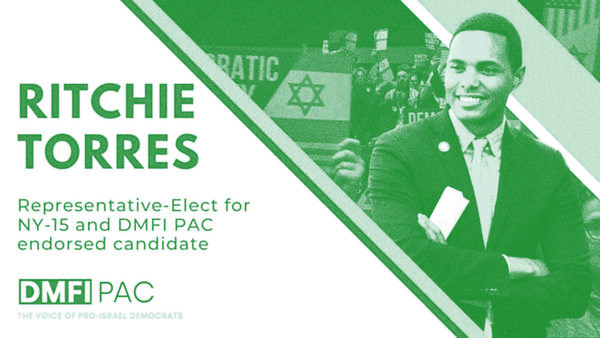
These same groups hope that other ambitious young Democrats—especially lawmakers of color—may attempt to copy Torres’s playbook. In Arizona’s 2nd Congressional District, 31-year-old state legislator Daniel Hernandez is running next year for an open seat, and proclaiming his intent to become the next “pro-Israel progressive” in the House of Representatives. Torres told Jewish Insider he is backing Hernandez. “I see myself in Daniel: a pro-Israel progressive who has been drawn to public service by the power of his own lived experience,” he said. The Israel lobby seized another opportunity with the August special election in Ohio, where the top rival to progressive firebrand Nina Turner was Shontel Brown, a Black woman who has allied herself with the establishment. “I’m hoping for more Ritchie Torreses,” said Chouake, in an interview before the special election. “We’re working on that in the Ohio race.” Israel advocates gave Brown about $500,000 in donations, while Democratic Majority for Israel (DMFI), a group that defends Israel-supportive Democrats and opposes Israel-critical progressives, spent over $2 million in support of Brown or in opposition to Turner. Ultimately, Brown defeated Turner by a six-point margin, with groups like DMFI and the Jewish Democratic Council of America taking credit. In a victory speech, Brown described her first trip to Israel, in 2018, and thanked her “Jewish brothers and sisters.” Speaking at an August event organized by Pro-Israel America PAC after the primary, Torres framed Brown’s victory as a “counterrevolution” against the “hard left,” and said that the “marriage between the pro-Israel Jewish community and the African American community” would save the Democratic Party from capture by left-wing forces.

So far, a handful of recently-elected lawmakers of color have led the challenge to the Democratic consensus on Israel. But, as evident in the figure of Torres, the Israel lobby sees the courting of progressive Black and brown politicians as a strong strategy for upholding the status quo. The question of which approach to Israel/Palestine becomes dominant in the Democratic Party may depend, in part, on the trajectory of Torres’s career, and on the ability of Israel-advocacy groups to convince others to follow in his footsteps. As Archie Gottesman, a DMFI board member and Torres donor, gushed at a 2020 Torres event: “I wish that we could clone you so there was a million Ritchies running around talking about Israel.”
NOTHING IN TORRES’S BIOGRAPHY suggested that he would someday defend Israel’s interests on the House floor. He grew up poor, the child of a single mother, in the Throggs Neck Houses, a public housing development in the East Bronx. When he was in high school, a principal impressed by his intellect introduced him to Bronx politician James Vacca, who put Torres to work on his 2005 city council campaign. In 2013, with Vacca’s encouragement, Torres himself ran for city council, to represent the Central Bronx neighborhoods of the 15th District, where more than a third of the largely Black and Latinx residents live under the poverty line. Promises to improve public housing and crack down on negligent landlords won him the backing of the Working Families Party, major unions, and the Council’s Progressive Caucus. These endorsements proved helpful in a crowded primary: He beat out five other candidates, becoming, at 25, the youngest serving councilman, and the first openly gay elected official in the Bronx.
As a city councilman, Torres joined the Progressive Caucus and built a reputation as a tenacious watchdog. In 2014, as chair of the Committee on Public Housing, he held the first-ever hearing inside a public housing complex, lambasting the New York City Housing Authority for failing to replace the faulty, supposedly temporary boilers that were installed as a stopgap after Hurricane Sandy. After the hearing, Senator Chuck Schumer’s office called the Housing Authority, and the Federal Emergency Management Agency agreed to fund the boiler repairs. The episode became part of what City and State called “the lore of Torres,” cementing his standing as a champion of the poor. (It also prefigured his celebrated protest of Donald Trump’s cuts to federal housing programs, including his arrest at a demonstration in 2017.)
Even as Torres’s standing rose in progressive circles, he began to build relationships with Israel-advocacy groups. In 2015, he agreed to join a trip to Israel for New York lawmakers planned by the Jewish Community Relations Council of New York and the UJA-Federation of New York. The junket attracted the attention of Palestinian rights activists, and a coalition that included groups like Jewish Voice for Peace, Al-Awda NY, the Committee Against Anti-Asian Violence, and Queers Against Israeli Apartheid tried to pressure the politicians to cancel it. Torres’s office initially agreed to a meeting with some of the activists, according to Emmaia Gelman, a member of Queers Against Israeli Apartheid, but canceled it shortly before it was supposed to take place. Instead of sitting down with the activists, Torres delivered his answer to their request through the media. “What would be the purpose of a dialogue?” he responded when a reporter for Gay City News raised the issue of the trip’s critics. Torres’s most prominent encounter with the activists occurred at the protests they staged outside City Hall. The councilman later described the tone of the protests as “vitriolic,” recalling in an interview with Jewish Insider that some activists had accused him of pinkwashing, a word that refers to the strategy of raising Israel’s record on LGBTQ rights to deflect from its human rights abuses. As if to illustrate their point, he told a story about passing an activist whose shirt read “Queers for Palestine” and responding: “Does the opposite exist? Are there Palestinians for queers?”
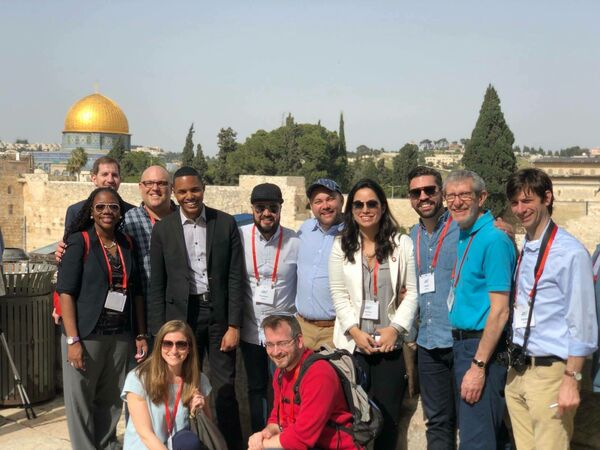
In the end, the trip to Israel did little to dent Torres’s reputation. At the time, he was better known as the lead sponsor of the Right to Know Act, a legislative package designed to rein in the abuses of the New York Police Department. Endorsed by over 200 organizations and prominent family members of people killed by New York law enforcement, it would have required officers to provide reasons for many types of stops, and, when a stop did not result in an arrest or summons, to give out a business card bearing their name and rank as well as the phone number for complaints about law enforcement conduct. Police reform organizers had tapped Torres to carry the bill in 2014: As a young, talented legislator of color from a neighborhood where police abuse and brutality were commonplace, he seemed to be the ideal candidate to secure its passage. “We trusted him,” said Rachel McCullough, political director of Jews for Racial & Economic Justice (JFREJ), a key backer of the Right to Know Act. “We recognized that this guy really gets it, he’s committed, he’s ready to do what it takes.”
But even as Torres worked with activists to shepherd the bill, he was also, unbeknownst to them, negotiating with Mayor Bill de Blasio and the NYPD. In December 2017, the Bronx councilman struck a deal behind closed doors, agreeing to revise the bill so that NYPD officers would no longer be required to ID themselves during the majority of police stops, including traffic stops. His allies were shocked. “Caving to the NYPD is a pastime in New York City politics, but he was in relationship with us and those families in a way the others never were,” said McCullough. Three years later, during Torres’s run for Congress, 12 family members of men killed by police in New York would author an open letter urging voters to reject his candidacy. “The people of the 15th Congressional District deserve a real leader,” the family members wrote, “not one, like Ritchie Torres, who will bend to the political winds and collude behind your backs with the NYPD and betray families whose loved ones were murdered by police.”
Even as Torres worked with activists to shepherd the Right to Know Act, he was also, unbeknownst to them, negotiating with Mayor Bill de Blasio and the NYPD.
Defending his decision on the city council floor during a debate on the bill, Torres cast himself as a pragmatist willing to work for incremental gains, and his former allies on the left as idealists who valued “progressive purity [more] than actual progress.” He maintained that he was proud of the deal, “even if it means I’m no longer beloved in progressive circles.” “It was the first time that I saw him demonstrate that he was willing to operate in such a transactional way politically in order to get some kind of victory, even if it was a loss for the directly-impacted people,” said Julia Salazar, a state senator representing North Brooklyn neighborhoods who was a JFREJ organizer at the time.
Torres announced his resignation from the City Council Progressive Caucus shortly afterward, but continued to position himself as an ally of the left. In 2016, alongside other Working Families Party-backed officials, he bucked the establishment by endorsing Bernie Sanders’s insurgent run against Hillary Clinton. In August 2018, following Ocasio-Cortez’s surprise victory over Rep. Joe Crowley, the fourth-most-powerful House Democrat at the time, Torres rejoined the Progressive Caucus. He told Politico that Ocasio-Cortez’s victory broke “the grip of psychological dependency on established power structures,” and was “a liberating moment for me.” But though he had officially rejoined the progressive camp, his relationships with its members continued to fray.
In March of 2019, Jose Serrano, the congressman who represented the 15th Congressional District in the South Bronx—the poorest Congressional district in the country and the most Democratic—announced his retirement due to Parkinson’s disease. The retirement of an incumbent is rare, and Serrano’s set off a scramble among Bronx politicians. In July, Torres announced his entry into the race, which would ultimately include well-known figures such as the former speaker of the city council, Melissa Mark-Viverito, and a controversial councilman and anti-gay pastor named Ruben Diaz. Torres was also competing against a progressive challenger, housing activist Samelys López, a former Serrano intern who ran on popular progressive policies like Medicare for All and a Green New Deal.
Torres’s campaign video highlighted his rise from poverty to city government, and presented him as a pathbreaking gay lawmaker—setting up a sharp contrast with Diaz, whom he called a “vicious homophobe.” At the same time, he also positioned himself against the rising democratic socialist left. While Torres received endorsements from prominent progressive officials like City Councilmen Brad Lander and Antonio Reynoso, NYC-DSA backed López, who was also endorsed by Ocasio-Cortez and Sanders. Torres went on the attack, telling The New York Times in June 2020, “If you go to a Black church in the South Bronx, you are unlikely to come across an assemblage of Democratic Socialist revolutionaries . . . It’s a fact that the DSA has the most robust membership in wealthier, whiter gentrified neighborhoods.” Rejected by progressives, Torres “flipped,” said McCullough. “A huge part of his calculation seemed to be, ‘How can I build my own career by using the left as a foil or a punching bag?’”
Using BDS is “a convenient, easy way to attack DSA . . . Torres knows it’s a line of attack that will gain traction, that has support.”
Torres’s opposition to the DSA-adjacent left also aligned him with Israel-advocacy groups. In 2017, DSA had officially endorsed the Palestinian-led Boycott, Divestment, and Sanctions movement (BDS), a campaign to pressure corporations and governments to cut off financial relationships with Israeli military and state institutions. Tlaib, a DSA member, helped bring the movement to Congress in 2018. Torres used DSA’s support for BDS as a cudgel, portraying the group as a collection of wild-eyed extremists who posed an existential threat to the Democratic Party. “BDS poisons whatever it touches,” Torres told Jewish Insider in December 2019. “There is a deep rot of antisemitism at the core of BDS . . . I worry deeply that BDS has the potential to poison progressivism.” These comments cemented the sense within the New York left that Torres had aligned himself with the establishment. Using BDS is “a convenient, easy way to attack DSA . . . [Torres] knows it’s a line of attack that will gain traction, that has support,” said Sumaya Awad, a Palestinian member of DSA and the director of strategy and communication for the Palestinian activist group Adalah Justice Project.
One current New York Democratic aide, who requested anonymity to speak freely about local political players, argued that Torres’s embrace of the establishment on Israel is a reflection of his “contrarian nature,” and signals his intention to operate independently from other young progressives. In meetings with Jewish groups, and especially in conversations about Israel, he has often “tried to impress upon people that just because he was young, didn’t mean that he was in AOC’s camp,” said George Arzt, a New York City political consultant who advised Torres during his Congressional run.
Torres’s alignment with the Israel lobby proved strategic. Though the real estate industry poured the most funding into his campaign—$290,000, an investment in a district where the industry saw opportunity for development—“pro-Israel” groups were responsible for a chunk of his budget. Torres won the backing of groups—including NORPAC, To Protect Our Heritage PAC, Pro-Israel America PAC, City PAC, and DMFI’s PAC—that together gave him about $34,000 in donations, according to a Jewish Currents analysis of federal election records. DMFI also spent over $50,000 in independent advertising on Torres’s behalf. “I’ve spent a lot of time with politicians,” Mark Mellman, the head of DMFI, said at a 2020 event with Torres. “Rarely, rarely, do you meet somebody, as I did with Ritchie, and walk away saying, ‘This person is a superstar.’”
“I’ve spent a lot of time with politicians,” Mark Mellman, the head of DMFI, said at a 2020 event with Torres. “Rarely, rarely, do you meet somebody, as I did with Ritchie, and walk away saying, ‘This person is a superstar.’”
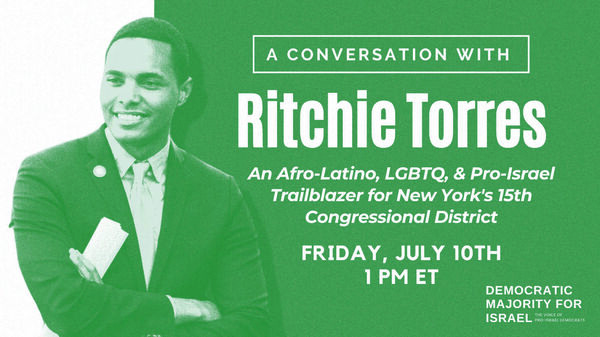
Torres also received at least $28,000 in individual donations from prominent Zionists, including some with anti-Muslim and anti-Arab views: Nina Rosenwald, the founder of the Gatestone Institute, a think tank that has called for a ban on all Muslim immigration, gave $1,000 to Torres; Marty Peretz, the former New Republic editor who once wrote that “Muslim life is cheap” and Arab society is “backward,” gave approximately $2,600. Haim Saban, the Hollywood mogul who called for “more scrutiny” of Muslims after the 2015 ISIS attacks in Paris, donated $2,800, as did Gottesman, the DMFI board member, who once wrote: “Gaza is full of monsters. Time to burn the whole place.”
Torres would go on to win the Democratic primary with 32% of the vote, easily defeating his 11 opponents. The evening that voting closed in New York, June 23rd, demonstrators marched through the streets of Tel Aviv to protest Netanyahu’s intention to annex Israeli settlements in the West Bank. Torres did not acknowledge the furor over annexation two days later, when he made his first post-election public appearance at an Israeli Embassy event to celebrate gay pride, alongside Israel’s pugnacious then-ambassador to the US, Ron Dermer, and an Israeli army lieutenant colonel. In pre-recorded remarks, Torres celebrated gay life in Israel and said that he feels “at home in Israel, as though it were my own country, because it has values that are recognizably democratic and recognizably pro-LGBTQ.”
IT’S HARD TO SAY EXACTLY WHY Torres has chosen to be Israel’s foremost defender among his generation of legislators; Torres declined an interview request from Jewish Currents to discuss his views in-depth, and his office did not reply to a detailed list of questions. But there are plenty of reasons for a politician of color to stick to the party line. Black politicians often face especially intense pushback for expressing sympathy for Palestinians or criticism of Israel; if they don’t reverse themselves on Palestine, donor-powered campaigns sometimes seek to undermine their electoral prospects. This pattern reaches back decades, to the late 1970s, when Andrew Young, the first Black ambassador to the United Nations, was forced to resign after meeting with a representative of the Palestine Liberation Organization (PLO). Half a century later, Black lawmakers like Rep. Ilhan Omar still contend with charges of antisemitism whenever they raise the issue of Israel’s human rights abuses. Running for election in 2020, Sen. Raphael Warnock was called “the most anti-Israel candidate anywhere in the country” after his opponent turned up a sermon in which he had expressed empathy for Palestinians. (Warnock responded by embracing a more establishment line, condemning BDS and emphasizing “the critical nature of our current partnership to Israel.”) As Peter Beinart, editor-at-large of Jewish Currents, wrote at the time: “Black politicians who draw on their own experiences to support nationalist and anti-imperialist movements in the developing world have been accused of anti-Americanism. And in a political culture where Israel is seen as embodying the same values as the United States, Black support for the Palestinian cause has often been deemed anti-American too.”
On the other hand, there are benefits to following Washington’s orthodoxy on Israel, including the possibility of an alliance with the leaders of the Congressional Black Caucus (CBC), who wield immense influence within the party and whose members, like Reps. Jim Clyburn and Hakeem Jeffries, occupy top positions in the House Democratic Caucus. The CBC’s influence within the Democratic Party was a product of the civil rights movement’s gains, and they challenged not only Republicans but also the Democratic establishment for paying insufficient attention to the struggles of the Black working class. But as the energy of the civil rights movement waned, caucus figures “began to govern like typical politicians,” wrote Princeton University historian Keeanga-Yamahtta Taylor in a June 2020 article for The New York Times. “Staying in office became a priority, and as black legislators, they often had fewer resources. That meant more fund-raising from entities that may have been at odds with their constituencies.” It also meant a more conservative political disposition, including on Israel, which many caucus members have continued to support even as its military occupation has grown more entrenched.
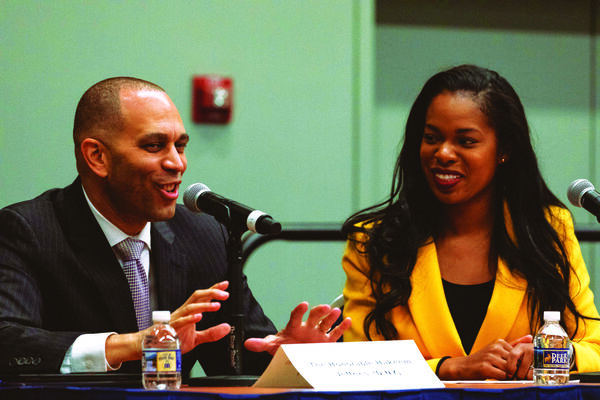
Both Torres’s allies and his rivals have speculated about the reason for his unique interest in Israel. “Ritchie Torres’s outspoken, uncritical position on the activities of the Israeli government is baffling,” said a prominent New York Democratic activist from Torres’s district who requested anonymity so as not to alienate Torres. The New York Democratic aide cast it as a symptom of the fact that he does not “see himself as accountable to grassroots organizations.” Others argue that aligning himself with pro-Israel Democrats serves Torres’s ambition by giving him access to powerful political allies and donors from around the country. “[He thinks] his path to political stardom in New York City is to be a champion of the pro-Israel establishment,” said a staffer at a progressive organization who requested anonymity because their group engages with Torres.
But those who know Torres believe his orientation toward Israel to be sincere. “His sentiments appear heartfelt, and not just about raising money,” said Sheinkopf, the pro-Israel Democratic operative. “This is not just a song he came up with or wrote yesterday.” Noticing Torres’s hawkish stance harden as his profile rose, one former close ally—New York City Councilman Brad Lander, who recently won the Democratic primary to become City Comptroller—pushed the soon-to-be congressman to hear about Israel’s military occupation of Palestine from a Palestinian perspective. According to two sources familiar with the Lander–Torres discussions, Torres agreed, and in the fall of 2020, held a Zoom call with Yousef Munayyer, a leading Palestinian American scholar and writer. Torres mostly listened as Munayyer talked about his experience as a Palestinian citizen of Israel, the roots of the BDS movement, and the realities of Israeli control over Palestinian life. He did not respond with the usual talking points he espouses in public, and instead asked what the two sources characterized as thoughtful questions.
“His sentiments appear heartfelt, and not just about raising money,” said Sheinkopf, the pro-Israel Democratic operative. “This is not just a song he came up with or wrote yesterday.”
But even if Torres seemed open to hearing a counternarrative in private, his public stance did not change. Since arriving in Congress, Torres has positioned himself as a staunch ally of the Israel lobby. In March, he criticized the International Criminal Court for investigating Israel over alleged war crimes. In April, he signed onto an AIPAC-backed letter opposing progressive calls to impose conditions on US military funding to Israel. The same month, on Israeli Independence Day, he took to the House floor to praise Israel’s “ingenuity” and its emergence as a “start-up nation” and “water superpower.”
Since the latest round of violence this spring, Palestinian rights activists have argued that presenting as a “pro-Israel progressive” is becoming more difficult. Munayyer, the Palestinian American analyst, sees many Democrats “at the top of the party” who want to return to “a strong bipartisan consensus on supporting everything Israel does.” “But those are the dinosaurs of the party,” he said. “I don’t think that’s what the next generation of the party looks like at all.”
But if the Palestinian rights movement has seemed to gain purchase in Washington, the months since May have shown that its influence remains limited. On May 21st, the day after Israel and Hamas agreed to a ceasefire, the Biden administration approved the export license for the arms sale that Ocasio-Cortez and Sanders had sought to prevent. When bombs stopped falling on Gaza, congressional scrutiny of Israel’s use of US weapons fell off as well. “You don’t really see the same calls for accountability,” said Parker, of Defense for Children International—Palestine. Though this recent spate of violence produced “increased awareness, increased visibility,” he said, it has not yet spurred further action, such as renewed efforts to place conditions on US military aid to Israel.
“The Democratic Party of the future is likely not as hospitable to the pro-Israel community. So Torres is the anomaly. The question then becomes, ‘Is it good for Torres?’”
Even if there is a shift underway among Democrats, it’s not clear that it has the power to put pressure on Torres, or on other legislators who may follow his example. Activists like Beth Miller, senior government affairs manager at Jewish Voice for Peace Action, say that Torres is “misreading the direction of his own base.” But Sheinkopf believes that Torres is electorally secure. “The Democratic Party of the future is likely not as hospitable to the pro-Israel community,” he acknowledged. “So Torres is the anomaly. The question then becomes, ‘Is it good for Torres?’” Are the benefits of aligning with the Israel lobby worth the costs of taking an increasingly unpopular line? According to Sheinkopf, “The answer is yes, because he lives in a district where it is unlikely that he can be removed. The pro-Israel community ought to be finding more people like Ritchie Torres in districts where they can’t be beaten for some time, if ever.” So far, Torres does not have a 2022 primary challenger.
A previous version of this piece stated that Ritchie Torres was the youngest city councilman in New York history. In fact, he was the youngest one serving at the time. The piece also described Sumaya Awad as Palestinian American, rather than Palestinian.
